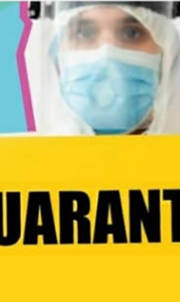
Battle Ready
Posted 21 Apr 2020 | Source: Vivel #AbSamjhantaNahin
"Patients are scared to reveal their accurate MEDICAL HISTORY> THEY ALSO MASK THEIR TRAVEL HISTORY, which poses a further challenge for us."
Recently, a prominent private hospital in Mumbai was declared a coronovirus containment zone after 26 nurses and three doctors tested positive.The United Nurses Association (UNA), Mumbai, alleged that hospital management had not provided adequate protective gear to its staffers. In Kolkata too, the Nilratan Sarkar (NRS) Medical College and Hospital had to send 64 medical professionals including 39 doctors, nurses, medical staff and non-medical staff to quarantine after a COVID-19 positive patient died in the hospital.
With over 9,000 COVID-19
cases in the country (at the time of writing this), India's healthcare sector is hugely understaffed with roughly one doctor per 100 people and 1.7 nurses per thousand people. Dr Swati Rajagopal, consultant, Infectious Disease & Travel Medicine, Aster CMI Hospital,
Bengaluru, is all too aware of these challenges as she deals with scores of COVID-19 suspects that come to her hospital every day. "Shortage of personal protective equipment (PPE) has been the concern, globally. At Aster, with our core infection control team, management and quality departments, we have streamlined and attempted to rationalise the use of PPE. Also as per WHO guidelines, it's crucial to conserve medical resources but also use them judiciously for valid cases. And that's the real challenge of this pandemic," explains Dr Rajagopal.
At Aster CMI Hospital, strict protocol is being maintained as far as COVID-19 preparedness is concerned. "We have a designated Flu (fever) clinic; a triage system of pre-admission through th emergency room; a designated area of admission of suspect cases and confirmed cases, and step down marked area of hospital. We ensure that we use appropriate PPE while dealing with the patients," she informs.
According to her extensive planning, implementation of efficient infection control practices, coordination between healthcare providers, nurses, support staff, and hospital management is needed.
"Though the last few weeks have been challenging for healthcare professionals across the globe, everyone its trying their best. Collaboration between private and government institutions, along with laboratories, can help us overcome it, she says. She adds that basic practices like cough etiquette and hand hygiene can help save lives."Patients are scared to reveal their accurate medical history. They also mask their travel history, which poses more of a challenge for us.
People should also not stigmatise patients who test positive and understand that if treated on time, it has a good recovery rate," Dr Rajagopal says, highlighting the challenges.
For frontline medical workers, it is important to get adequate rest to come back to work the next day, and not allow anxiety to cripple the spirit. Dr Rajagopal is convinced that this global health crisis has a positive side to it. "The COVID-19 pandemic has united all sections of the society. We have understood the value of working as a team and also learnt the fact that nothing is more important than good health,"
She concludes. >
